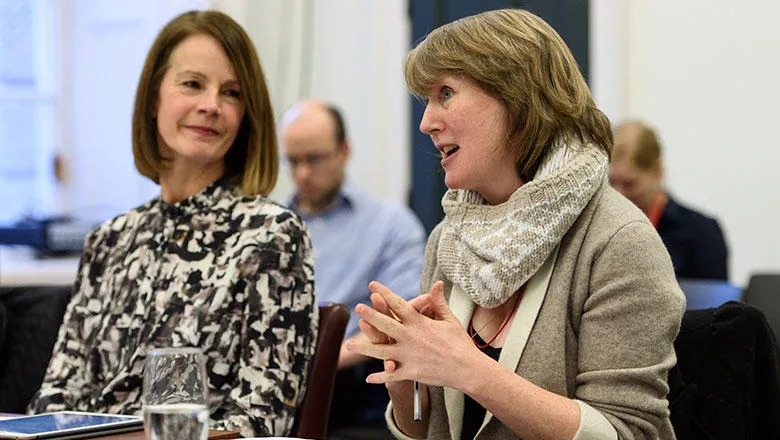30 November 2018
University Partnership Programme Foundation session on role of universities
A public evidence session at King’s College London explored the role universities play in supporting culture, arts and heritage, and how as ‘anchor’ institutions they support their local communities.

A public evidence session at King’s College London explored the role universities play in supporting culture, arts and heritage, and how as ‘anchor’ institutions they support their local communities.
The event, hosted by the University Partnerships Programme (UPP) Foundation, brought together leading experts including Dame Helen Ghosh, formerly Director-General of the National Trust and Master of Balliol College, Oxford, and Jacqui O’Hanlon, Director of Education at the Royal Shakespeare Company, to discuss how culture, arts and heritage connects to civic society and university life.
These ‘delegate witnesses’ were invited to define what it means to be a civic university. Baroness Deborah Bull, King’s College London’s Vice-President & Vice Principal (London) and Senior Fellow for Culture, underlined that a civic university must have the ‘strength to shape local communities and economies’, while Jacqui O’Hanlon emphasised that the role of a civic university is to ‘democratise who has access to knowledge’.
The group was asked to provide examples of a civic university in action. Baroness Bull spoke about King’s Maths School, which provides high quality mathematics teaching alongside physics and computing education to give students the knowledge and skills they need to study mathematical courses at university. Helen Ghosh commented on a collaboration between the University of Manchester and the National Trust’s Quarry Bank Mill that made historical papers – such as documents unveiling the secrets of the Mill’s Workers' Library – available to visitors.
The afternoon’s session hearing focused on universities and their place within their local communities. The group of ‘expert witnesses’ included Professor Ed Byrne, Principal of King’s College London and The Rt Hon. Lord David Willetts, former Universities Minister, MP for Havant and Executive Chair of the Resolution Foundation.
The Commissioners asked whether there should be an external framework for measuring a university’s local impact. Professor Byrne rejected this idea saying that the Research Excellence Framework’s impact statement could instead feature a section dedicated to a university’s civic purpose and mission. Lord Willetts questioned this suggestion saying that it could make the framework more complicated.
The Commissioners’ ended the session by asking the witnesses for their key recommendation for the report. Professor Byrne stated serving the needs of local communities should be a central part of a university mission, for staff, academic and professional, students and alumni, and it must be developed alongside local boroughs.
The Commission’s report on how universities most successfully serve their place in the 21st Century will be published early 2019.
